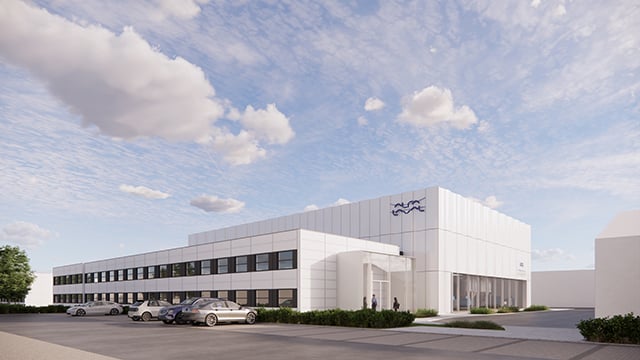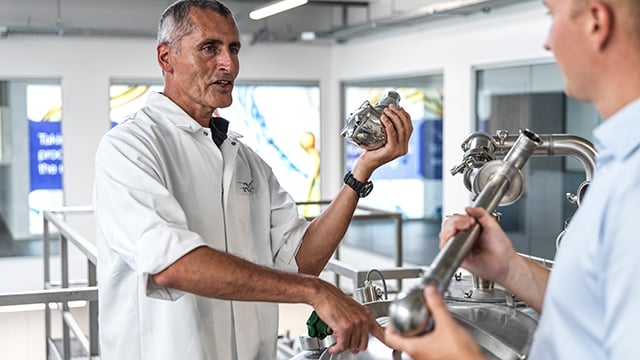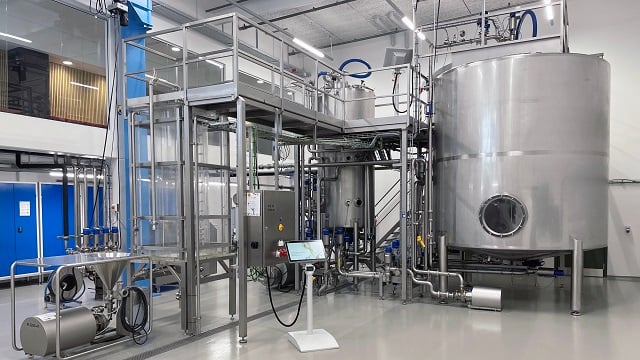2025-01-09 Product news
Alfa Laval invests in Food Innovation Centre to reinforce contribution to the transformation of the global food system
Alfa Laval’s new world-class Food Innovation Centre will offer customers from across the food and beverage industries the opportunity to develop new food products and efficient solutions to substantially reduce the environmental impact of food production in support of the required transformation of the global food system.
Today, the global food system contributes significantly to biodiversity loss and is accountable for a third of greenhouse gas emissions, the consumption of a third of all available energy and 70% of all withdrawn freshwater (UN, 2024).
“With our range of technologies, solutions and competences, Alfa Laval is in a strong position to enable food and beverage producers to take a much bigger responsibility in their supply chain. We believe this is needed in our effort to enable the global food system to feed and nourish a growing global population within the planetary boundaries,” says Lars Dithmer, President Alfa Laval Business Unit Food Systems.
Work to establish the new Food Innovation Centre in Copenhagen, Denmark, has already begun. The facility will be located at the headquarters of Alfa Laval’s Food and Water businesses and is planned to be completed in 2027, covering around 1,200 m2 and supported by a visitor centre. The location puts the facility at the heart of Denmark’s thriving bio-solutions scene and the strong academic base of the Copenhagen and Southern Sweden region, making it ideal for engaging with bright minds and businesses. The new facility will complement Alfa Laval’s existing test facilities in Denmark and Sweden.
Concept for Food Innovation Centre
The facility will showcase Alfa Laval’s technologies and solutions and will be industry-leading in the breadth of its vision – developing new and innovative ways to produce more nutritious food while keeping a focus on the evolution of existing processes to ensure they are as sustainable and efficient as possible. The facility will also serve as a platform for the development of digital solutions including harnessing the full value of artificial intelligence. The aim is to enable a seamless and ongoing optimization of food processing to positively impact operational efficiency, yield, uptime and environmental footprint.
The facility will focus on two main areas:
- Conventional foods, ingredients and beverages: developing processes and technologies to produce more nutritious food with higher yields and less energy, water and raw materials, while recovering and upcycling resources from waste streams.
- Next-generation food: developing new processes and technologies for new plant-based and fermentation-based foods, from proof of concept through scale-up to industrial production to achieve a radically reduced environmental impact.
Johan Agrell, Vice-President of Next-generation Food, Food & Water Division, says: “This will be a world-class test and development facility that will tackle the challenges of supplying food today and in the future. It will represent an opportunity to partner up across the entire ecosystem of food innovation with companies and organizations of all sizes – from start-ups to global food corporations to academia – and work with them in different ways. The set-up is also intended to help accelerate the regulatory approval process.”
The facility will house full food processing lines and enable flexible testing and development to understand capacities and performance levels. “We will be able to take concepts and ideas and work with them to establish how to best to upscale these through the latest technologies,” says Johan Agrell.
Testing and development will serve as a vehicle for the development of brand-new approaches and the upskilling of people. “A crucial aspect of the big food transformation is to empower bright minds with new insight to act. The facility will be a key place to learn and train so we will be helping to develop the innovators and experts of the future.”
Initial focus on protein
Protein is the most significant and immediate challenge facing the industry given that it constitutes the single-biggest obstacle in terms of securing sufficient and nutritious food to feed the world in a sustainable way by 2050 (FAO, 2024).
“So, when operations begin, work will initially focus on protein processing”, says Johan Agrell. “We will have a primary focus to develop new and more efficient ways to extract proteins from plant-based sources and through fermentation-based processing, to produce new healthy foods with less water and energy and from less raw materials.”
“In parallel, the facility will have focus on meat and fish-based processing,” says Johan. “We know that animal-based proteins constitute a heavy load on the environment. However, animal proteins will many years ahead be required to feed the population of the world. So, our mission is to continue our efforts in optimizing production of animal-based proteins and minimizing the environmental impact of this needed food source.”
Alfa Laval’s ambition is to use the facility to tackle the challenges holistically, looking at innovation and how to make conventional production methods better, with improved yields, less energy and water, while ensuring all resources in waste streams are recovered and upcycled.
More information:
Next-generation food | Alfa Laval
Alfa Laval Life-cycle Assessment Solution | Alfa Laval
About Alfa Laval
The ability to make the most of what we have is more important than ever. Together with our customers, we’re innovating the industries that society depends on and creating lasting positive impact. We’re set on helping billions of people to get the energy, food, and clean water they need. At the same time, we are decarbonizing the marine fleet that is the backbone of global trade.
We pioneer technologies and solutions that free our customers to unlock the true potential of resources. As our customers’ businesses grow stronger, the goal of a truly sustainable world edges closer. The company is committed to optimizing processes, creating responsible growth, and driving progress to support customers in achieving their business goals and sustainability targets. Together, we’re pioneering positive impact.
Alfa Laval was founded 140 years ago, has customers in some 100 countries, employs more than 21,300 people, and annual sales in 2023 were SEK 63.6 billion (5.5 BEUR) in 2023. The company is listed on Nasdaq Stockholm.
Contact
Johan Agrell
VP Next-generation Food
Alfa Laval Food & Water Division
Hanne Ovesen
Communications Manager, Sustainability
Alfa Laval Food & Water Division
hanne.ovesen@alfalaval.com





